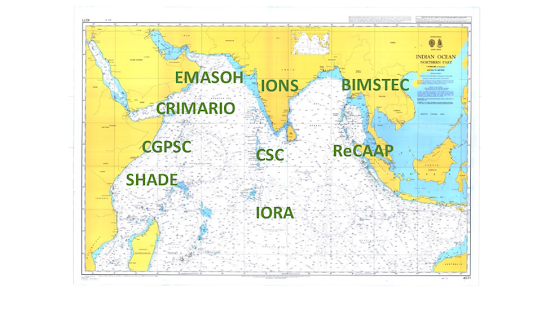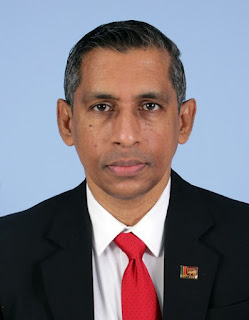Figure 1. Regional Cooperative
mechanisms in place for Indian Ocean
Today’s global geo-strategic environment is based on maritime activity; and matters maritime are embedded from economies to governance. Thus, as islanders it is indeed important for the population to understand the need of navy in today’s global context. The above figure 1. illustrates some of the regional cooperative mechanisms of global scale available in the Indian Ocean region and it is pertinent to note that the Sri Lanka Navy (SL Navy) is directly or indirectly involved as a partner in these maritime cooperative mechanisms.
In today’s geo-strategic posture
and in diplomacy , the Navy is continuing to be an integral and valuable
component. Naval prowess is in fact a deciding criterion of diplomacy, and Gunboat Diplomacy is a
terminology that originated through this necessity. During the cold-war era it
was the naval might that flexed muscle to carry forward national interest beyond maritime jurisdictions. A good example was the
1962 Cuban Missile crisis, where Navies were poised to unleash their devastating
arsenal, based on what their political masters decided.
Countries pursue their strategic
goals based on their national aspirations. These national aspirations in
today’s context are economic in priority. It is economic power that keeps stability and strength of a country that in-turn
keeps their status in global power-playing.
The Chinese Military doctrine (2017) indicates that there is no economic
development without security and no security without economic development. Many
countries have similar policies promulgated as Policy papers, White Papers or an
Outlook document. All these poised to indicate the intentions of the
Governments. The Governments evaluate each other through these policies and
also from the action taken by respective Navies to decide how policy oriented
the Governments are.
When Boxing Day Tsunami hit
Indian Ocean region countries in 2004, Indian Naval prowess was exhibited to
the global audience. Within the course of hours Naval ships started sailing to
distressed areas with essential relief materials. This prompt and swift action
highlighted India’s capacity and capability in global scale thus boosted Indian
Government’s credibility and acceptance as a relief provider. The Navy had all
the necessary equipment’s to meet the Government’s higher strategic objectives.
They had hydrographic ships that can undertake the emergency survey demands to
make stricken harbours safe for access and operations, they had medical
facilities to support urgent lifesaving treatments, ships had integral
helicopter facilities to lift essential needs and had communication facilities
to coordinate the Command-and-Control measures even on the remote areas. To
undertake all these disaster management a Navy needs trained manpower and also
ability to work independently without burdening the State to which they came to
assist. And all these does not happen overnight; these preparations are an
end-result of a long-term process from manpower to equipment’s investments.
Navy’s have their own unique way
of keeping relations and ship visits (or port calls) takes high precedence in
this aspect. For any Navy; whether regional or extra-regional, Sri Lanka is a
favoured port visit for several reasons. They range from the location advantage
(almost half-way from Bab El Mandab in the west entry point to Malacca Strait
in the east), infrastructure convenience (availability of berthing space,
logistic support, safe and convenient harbour access, air connectivity etc.),
administrative convenience (such as protocol process, friendly environment etc.),
safety and security. Since 2010 we had nearly 600 warships belonging to 28
nations making port calls to Sri Lanka as per SL Navy records. Sri Lanka Navy
has accorded customary welcome to all these warships and most importantly all
such is recorded in public domain. All these ship visits are recorded in public
domain and one reliable source of information is the SL Navy website; www.navy.lk for any interested researcher.
Another Naval foreign relations
engagement is the Joint Exercises, done in-country or in foreign country. These
were being done well over three decades and continue as per the planned
schedules among the navies. One of the foremost in-country joint exercise is
the CARET (Cooperation Afloat
Readiness and Training) with US Navy and US Marines whilst the most
important outside engagement is the RIMPAC (Rim of the Pacific) done again with
navies in the Pacific rim nations. Through these joint exercises the navy
builds the foreign relations as such involve higher level exchanges benefitting
both parties.
Another foreign relation exercise
is the Ship Visits by SL Naval vessels in regional naval engagements. All
friendly foreign countries prefer to have the participation of other navies in
their exercises and manoeuvres and these are reciprocal in nature. For example, when Pakistan Naval ships
visit Sri Lanka, they expect SL Navy also take part in their engagements in
Pakistan, as it is an indicator of their naval cooperation. Thus, when SL Navy
does not take part when invited in these regional engagements that always
triggers diplomatic inquiries on the reasons for not participating! For these
regional naval engagements what matters is the participation and not the size
or the strength of the Navy, and all will cherish the company in the host
country.
Another major foreign relation
exercise the SL Navy conducts is the Galle Dialogue; the International Maritime
Security seminar hosted since 2010. This forum has proven itself as the only
maritime forum in south Asian region where all neighbourhood navies meet and
greet. These engagements in a way shows the island nation’s foreign policy and
the stand on foreign relations. In today’s geo-strategic environment in the
presence of USA’s Indo-Pacific policy and the Chinese Belt and Road, this
prominence has become ever more important.
As briefly explained above, Sri
Lanka Navy is there to engage in foreign relations whether in peace or in war.
This is the reason why all naval personnel must have a broad outlook of
regional and extra-regional affairs. As practitioners, they remain the frontline
engagement which may decide the status of the statehood, and several such
engagements in the past stand testimony for this. In 1987, Indian State of
Tamil Nadu showed that they are sending a flotilla of fishing vessels with
essential goods destine for population in Jaffna Peninsula besieged under the
ongoing Operation Liberation; the Wadamarchchi Operation. SL Navy was tasked to
prevent this flotilla flying ‘’Red Cross’’ flag crossing the IMBL
(International Maritime Boundary Line) whilst hectic diplomatic engagements
were going on. The remarks by the then Chief Minister of Tamil Nadu that the
flotilla will continue at any cost to Jaffna heated up the possible skirmishes
at sea. The Navy responded with all available fleet units forming a barricade
at IMBL enforcing a naval blockade that prompted the Tamil Nadu relief flotilla
to turn-back with no shot fired!
The Statecraft needs a Navy to
exercise the sovereign rights and quiet often these are needed in a flash,
therefore navies need to be fully geared up to meet these State interests at
all times. Some good examples are available in contemporary history where
weaker navies embarrassed the State when such was called upon to perform their
classic role. When the naval ships operate far away from their national
jurisdiction, the Commanding Officer of the naval ship is expected to make
decisions based on ground realities, international law and political
directives. Thus, Navies keep learning through each other learning how
situations were handled although one might not have faced similar situation
yet. These are an integral part of naval cooperative engagements as such are
connected with foreign relations.
The SL Navy even operates far
away from its maritime jurisdiction in pursuance of the national interest. The
fleet of ten (10) Offshore Patrol Vessels operates even in the Arabian Sea (to
the west of Maldivian archipelago) hunting drug peddlers. This is yet another
foreign relation exercise apart from being part of the maritime security
related action. Such operational deployments require much understanding and
coordinating in political front too. The success of high-sea drug interdictions
since 2017 has brought much recognition to the SL Navy in the region and beyond
not only among the navies and law enforcement agencies but also from the global
alliances operating in the Indian Ocean as watchdogs, monitoring bodies and even
the United Nations. Through these operations, the world measures the commitment
of the Sri Lanka Government to ensure the Indian Ocean remain safe and secure
for all seafaring nations. Today, Sri Lanka chair the Working Group on Maritime
Safety & Security of IORA and soon Sri Lanka going to assume the
Chairmanship of IORA thus the Navy stands at forefront in establishing the
credibility and partnership of Sri Lanka in the eyes of the IORA member States
as well as the maritime powers of the world.
References
https://www.cpf.navy.mil/rimpac/
By Rear Admiral YN
Jayarathna (Retd)
Rear Admiral YN Jayarathna was the Chief of Staff of the Sri Lanka Navy and concurrently holding the appointments as the Chief Hydrographer of the Navy and the Joint Chief Hydrographer to the Government of Sri Lanka.
He is an International Hydrographic Organization’s Category A qualified Hydrographer with vast knowledge on oceanographic affairs around the island nation. As the Chief Hydrographer he initiated Marine Spatial Data Infrastructure (MSDI) architecture and was instrumental in setting up the Mean Sea Level (MSI) for Sri Lanka. He holds a Master’s Degree in Defence Studies from University of Kelaniya, Sri Lanka and another Masters in Hydrography from University of Goa, India.
He retired after 35+ years of illustrious and unblemished service in the Sri Lanka Navy on 21st June 2022 on reaching mandatory retirement age of 55 years. During his career He has held the appointments of Director General Operations, Director General Training and Deputy Director General of Sri Lanka Coast Guard managing Tsunami in 2004 and Maritime Disasters. Further he represented the Government in Sethusamudram Expert Committee and was a member in the DEOCOM project which prepared the claim for Outer Continental Margin for Sri Lanka.
He is presently on contract with the UN as an International Consultant for Undersea Cables lectures widely on Maritime Security and Ocean Affairs.




Comments
Post a Comment